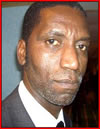Thursday, January 15, 2009
Rejoice Ngwenya, Harare, Zimbabwe
 The annual pilgrimage of Zimbabwean Christmas shoppers to South Africa arguably exceeds one million people. And this human caravan is only between the months of November and December. Even if one extrapolates that each traveler spends an average of one thousand South African Rands per trip, the economies of Musina, Polokwane and Tshwane possibly absorb no less than one hundred million United States dollars worth of Zimbabwean wealth every Christmas season.
The annual pilgrimage of Zimbabwean Christmas shoppers to South Africa arguably exceeds one million people. And this human caravan is only between the months of November and December. Even if one extrapolates that each traveler spends an average of one thousand South African Rands per trip, the economies of Musina, Polokwane and Tshwane possibly absorb no less than one hundred million United States dollars worth of Zimbabwean wealth every Christmas season.
To say both South Africa and Botswana are benefiting from Zimbabwe’s chaos is an understatement. Trade analysts agree that the inevitable demise of the Robert Mugabe dynasty will once again usher the Zimbabwean economy onto the brink of the second world, thus turning
Musina and Francistown into ghost towns, with their infrastructure condemned to white elephantry.
Yet if there are those who profit most from this human deluge it is the South African traffic police, not as an institution, but as individuals. My journey of one thousand four hundred kilometres to and from Polokwane’s NI highway encountered no less than six official checkpoints manned by over-enthusiastic and compared to their famished Zimbabwean counterparts, well-nourished police details.
About the same time in 2007, I was ‘charged’ several hundred Rands for driving on ‘poor’ tyre treads, which by Zimbabweans standards, were relatively ‘new’. This time my ‘crime’ portfolio was extended to driving without a reflector triangle, using blue halogen headlamps generally ‘meant for police in South Africa’ and also stopping along a five-ton prohibition zone.
Zimbabwe’s traffic laws do not punish private motorists for reflector triangles. The regulations relate to reflectors only on front and rear bumpers. My car has had blue halogens since the early nineties, installed by the previous owner who literally ‘lived’ in South Africa. Thus, when the Limpopo Province SAP traffic details threatened to slap a one thousand two hundred Rand fine on me, I was completely taken aback. One thing is that we Zimbabweans have no clue as to what fine each traffic law violation attracts on South African roads. So when the policewoman starts processing the ticket, she is sure that the shock-effect of the figure will spur me into ‘negotiations’. I made my case clear: “Look officer, these lights are pretty legit in Zimbabwe. How would I have known otherwise?” “Well, this is not Zimbabwe. So how much are you willing to pay?” “I am not willing to pay anything, officer, because I have not committed any crime.” “So you mean you don’t have anything to pay?” “Yes, officer, nothing. You know we Zimbabweans are poor, very poor. I have just enough money to buy rice, maize meal, sugar, cooking oil, soap…” “Okay, okay. I feel for you, but in future, make those lights white!”
Imagine out of five hundred thousand Zimbabwean cars, not to mention commercial vehicles, mini and big buses, if most of them had ‘real’ faults, would they not enter into profitable pre-fine ticket negotiations? So much for Thabo Mbeki’s forgettable African renaissance. It surely is a pleasure to be a South African traffic cop on the N1 highway, especially at Christmas! One wonders how many of these uniformed officers will be ‘millionaires’ during the FIFA 2010 Soccer World Cup!


